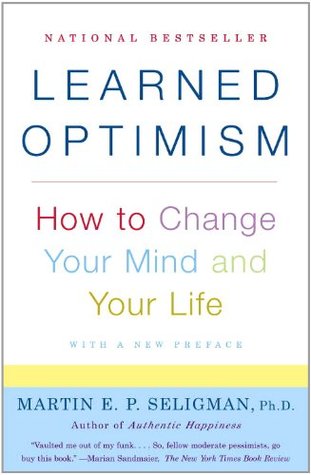More on this book
Community
Kindle Notes & Highlights
Anytime you find yourself down or anxious or angry, ask what you are saying to yourself. Sometimes the beliefs will turn out to be
accurate; when this is so, concentrate on the ways you can alter the situation and prevent adversity from becoming disaster.
But usually your negative beliefs are distortions. Challenge them. Don’t let them...
This highlight has been truncated due to consecutive passage length restrictions.
In many ways extreme individualism tends to maximize pessimistic explanatory style, prompting people to explain commonplace failures with permanent, pervasive, and personal causes. The growth of the individual, for example, means that failure is probably my fault—because who else is there but me? The decline of the commons means that failure is permanent and pervasive. To the extent that larger, benevolent institutions (God, nation, family) no longer matter, personal failures seem catastrophic. Because time in an individualistic society seems to end with our own death, individual failure seems
...more
To the extent that it is now difficult for young people to take seriously their relationship to God, to care about their duties to the country, or to be part of a large and abiding family, meaning in life will be very difficult to find. The self, to put it another way, is a very poor site for meaning. If an individualism
One possibility is that exaggerated individualism will fade away, that the maximal self will change back into the Yankee self. Another, frightening possibility is that, in order to shed depression and attain meaning, we will rashly surrender the newly won freedoms that individualism brings, giving
up personal control and concern for the individual.
The current yearning for fundamentalist religion throughout the world appears to be such a response.
The first changes the balance between the self and the commons by choosing to expand its commitment to the commons. The second uses learned optimism.
Selfishly, as a tactic of self-improvement, it might actually choose to scale down its own importance, in the knowledge that depression and meaninglessness follow from self-preoccupation.
Depression, I have argued, stems partly from an overcommitment to the self and an undercommitment to the common good. This
Exercise—not physical but moral—may be the antidepressant tactic we need. Consider adopting one of the following for yourself:
It is not necessary to undertake this in a selfless spirit. It is perfectly all right for you to do this because it is good for you, regardless of
Most important, an emptiness inside you, the meaninglessness that rampant individualism nurtures, will begin to fill. Surely in this age of choice, this choice is ours.
A society that viewed depression as stemming from bad genes or bad biology would see little point in trying to change what we think when we fail. A society that views the self as minimal would not be much
interested in psychology in the first place. But when a society exalts the self, as ours does, the self, its thoughts and their consequences become subjects of careful science, and of therapy and self-improvement. This
One of the great bulwarks of the maximal self is that it believes the self can change the way it thinks.
And this belief allows change to take place. I do not believe learned optimism alone
Optimism is just a useful adjunct to wisdom. By itself it cannot provide meaning. Optimism is a tool to help the individual achie...
This highlight has been truncated due to consecutive passage length restrictions.
It is in the choice of the goals themselves that meaning—or...
This highlight has been truncated due to consecutive passage length restrictions.
When learned optimism is coupled with a renewed commitment to the commons, our ep...
This highlight has been truncated due to consecutive passage length restrictions.
In the first chapter we talked about two ways of looking at the world, the optimistic and the pessimistic. Until now, if you were a pessimist you had no choice but to live in pessimism. You
would endure frequent depressions. Your work and your health would suffer. It would always be wet weather in your soul. In exchange for this you might have gained a keener sense of reality and a stronger sense of responsibility. You now have a choice. If you learn optimism, you can choose to use its techniques whenever you need them—without becoming a slave to them. For example,
What you now have is more freedom—an additional choice. You can choose to use optimism when you judge that less depression, or more achievement, or better health is the issue. But you can also choose not to use it, when you judge that clear sight or owning up is called for. Learning
We must be able to use pessimism’s keen sense of reality when we need it, but without having to dwell in its dark shadows. The benefits of this kind of optimism are, I believe, without limit.


